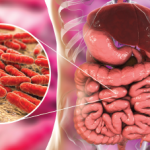There’s very little information about oxytocin and rheumatic disease, either as a marker of distress, a possible immunomodulator, or a mediator that might “dampen” disease expression. Oxytocin increases in response to estrogen, and is thus elevated in females, especially women stressed by disease.8 Oxytocin also increased in mycobacterial-induced arthritic rats when in extreme pain.9 Also, T-cell tolerance seemed to be modulated by oxytocin (and other neuroendocrine hormones).10-11 (Only someone like Bob would have these references.) Therefore, we would predict that oxytocin would be elevated in virtually all women with rheumatic disease. It should also be elevated in the individuals studied undergoing social stress, were it measured.
Is there a possibility certain stresses in particular circumstances could be good for patients (as they were for the mice)? Could oxytocin have played a role in the anti-arthritic effect of stress in Dr. Trentham’s mice? Could oxytocin play a role in pain in women with chronic rheumatic disease? Might this offer a possible opportunity to develop interventions? Bob will figure this out. And we will doubtless better understand the roles of stress and oxytocin on immunobiological processes in our diseases.
Dr. Panush is professor of medicine, division of rheumatology, Department of Medicine, Keck School of Medicine, University of Southern California in Los Angeles.
References
- Coombes BK, Bisset L, Vincenzino B. Efficacy and safety of corticosteroid injections and other injections for management of tendinopathy: A systematic review of randomized controlled trials. Lancet. 2010;376:1751-1867.
- Laham MN, Caldwell JR, Panush RS. Modulation of human lymphocyte responses by complement. J Clin Lab Immunol. 1982;9:39-47.
- Hashimoto M, Hirota K, Yoshitomi H, et al. Complement drives Th17 cell differentialtion and triggers autoimmune arthritis. J Exp Med. 2010;207:1135-1143.
- Miller G. The prickly side of oxytocin. Science. 2010;328: 1343.
- De Dreu CKW, Greer LL, Shalvi S, et al. The neuropeptide oxytocin regulates parochial altruism in intergroup conflict among human. Science. 2010;328:1408-1411.
- Slavitch GM, Way BM, Eisenberger NI, Taylor SE. Neural sensitivity to social rejection is associated with inflammatory responses to social stress. PNAS 107, 2010 (33): 14817-14822.
- Rogers MP, Trentham DE, McCune J, et al. Effect of psychological stress on the induction of arthritis in rats. Arthritis Rheum. 1980;23:1337-1342.
- Jezová D, Juránková E, Mosnárová A, Kriska M, Skultétyová I. Neuroendocrine response during stress with relation to gender differences. Acta Neurobiol Exp. 1996;56:779-785.
- Millan MJ, Millan MH, Colpaert FC, Herz A. Chronic arthritis in the rat: Differential changes in discrete brain pools of vasopressin as compared to oxytocin. Neurosci Let. 1985;54:33-37.
- Geenen V. Thymus-dependant T-cell tolerance of neuroendocrine functions: Principles, reflections, and implications for tolerogenic/negative self-vaccination. Ann NY Acad Sci. 2006;1088:284-296.
- Geenen V, Kecha O, Brilot F, Charlet-Renard C, Martens H. The thymic repertoire of neuroendocrine-related self-antigens: The biological role in T-cell selection and pharmacological implications. Neuroimmunomodulation. 1999;6:115-125.
